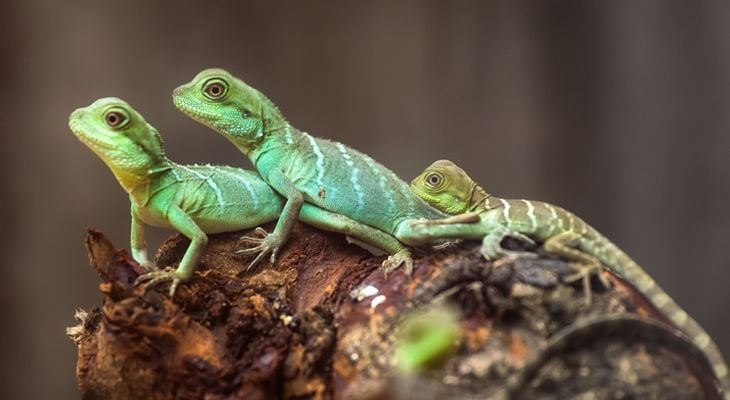
People with limited living quarters may find that reptiles such as lizards or turtles fit perfectly into their lifestyles. Before deciding on a reptile, learn as much as possible about them and their needs. Poisonous snakes and certain reptiles should never be kept as pets. Ask your veterinarian about the suitability of a particular animal before you make your decision. There are many things to consider before committing to a reptile as a pet.
Finding out if a Pet is Legal Where You Live
Many areas have enacted laws pertaining to keeping reptiles. Some are general and some are quite specific; in many places any reptiles that are considered dangerous (venomous snakes, alligators, etc.) are illegal but some places are even more restrictive (for example, in some states all constricting snakes including ball pythons are illegal).
Salmonella Risks and Prevention
All reptile owners need to be informed about Salmonella infections. While the risks shouldn't keep most people from keeping reptiles since with the proper management the risks are minimal. Still, owners should be aware of the risks, and the US Centers for Disease Control recommends that certain risk groups should be careful about contact with reptiles and amphibians.
The Importance of Light and Heat
Many problems with keeping reptiles can be traced back to not providing the proper environmental conditions, particularly heat. Proper lighting is also important for many reptiles. The equipment to provide the proper heat and light to captive reptiles is often quite expensive, but is absolutely essential to keeping pet reptiles healthy. It is important to find out exactly what conditions your reptile needs and never cut corners when it comes to meeting those conditions!
Why Choose Captive Bred Reptiles
There are numerous reasons why you should pick a captive bred reptile if at all possible, as explained here.
How to Pick a Healthy Reptile
It is important to keep in mind that depending on where you get a reptile, it may be very stressed, dehydrated, and prone to illness. Here are some items to look for when buying your reptile to increase the chances of picking out a healthy pet reptile.
While there are many types of reptiles that could be good pets, here we cover a few you could consider.
-
What to Do When Your Pet Goes on the Carpet
Straining to urinate, frequent urination, blood in the urine, and accidents in the house are common symptoms that pet owners report to their veterinarian. Many times the signs come on suddenly, as people find urine spots on the floor, often near the door where the dog goes outside. Cat owners may notice
Read more -
Vomiting Versus Regurgitation
When you come home to find a mess on the floor, it is easy to assume that the dog vomited. Vomiting is very common in dogs, as they often eat weird things! There are actually many other causes of vomiting, including parasites, kidney disease, liver problems, pancreatitis, and food allergies. Overall,
Read more -
Understanding Canine Compulsive Disorder
If your dog has developed a tendency to pursue the same pointless activity -- sucking on his flanks, chasing his own tail, barking or snapping at thin air, et cetera -- he may be suffering from canine compulsive disorder, or CCD. Fortunately, treatment and training can help him overcome his obsession. Defining
Read more -
Types of Diabetes in Dogs
Most people have heard of diabetes and associate it with needing to administer insulin. But actually there are two different kinds of diabetes: diabetes mellitus and diabetes insipidus. Their symptoms can be similar, but their causes are totally different and thus their treatments are completely different. Diabetes
Read more
